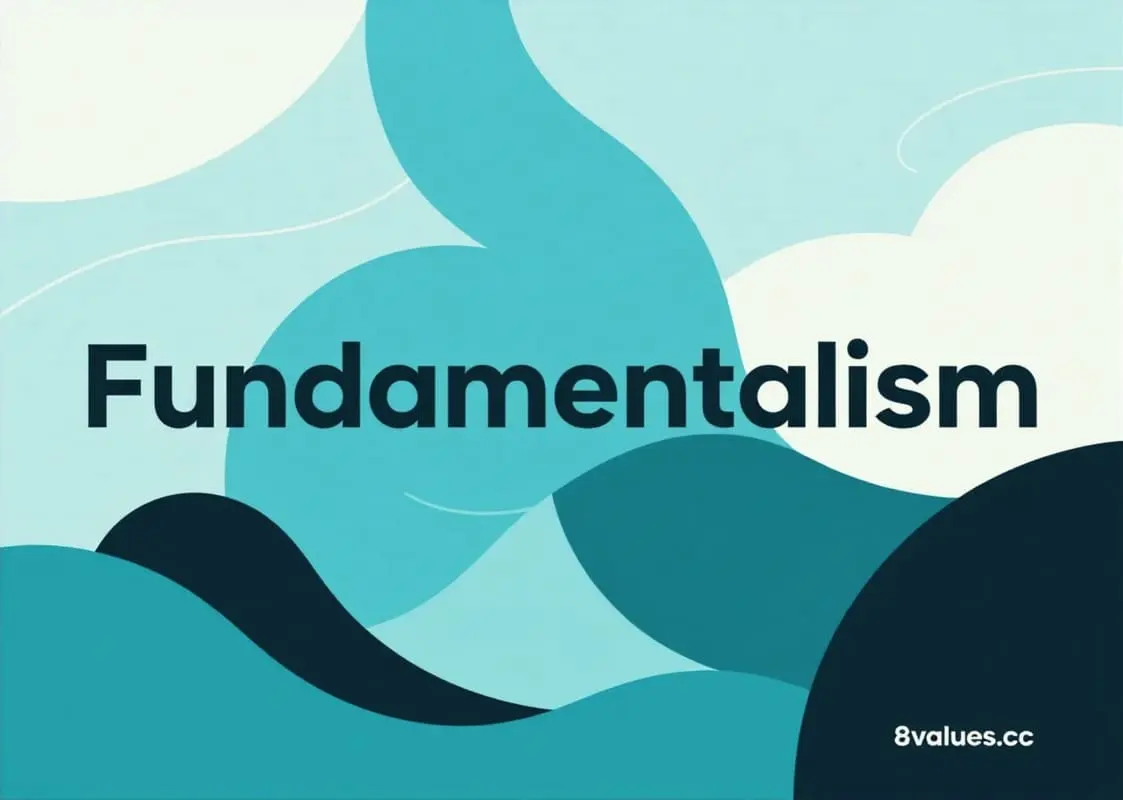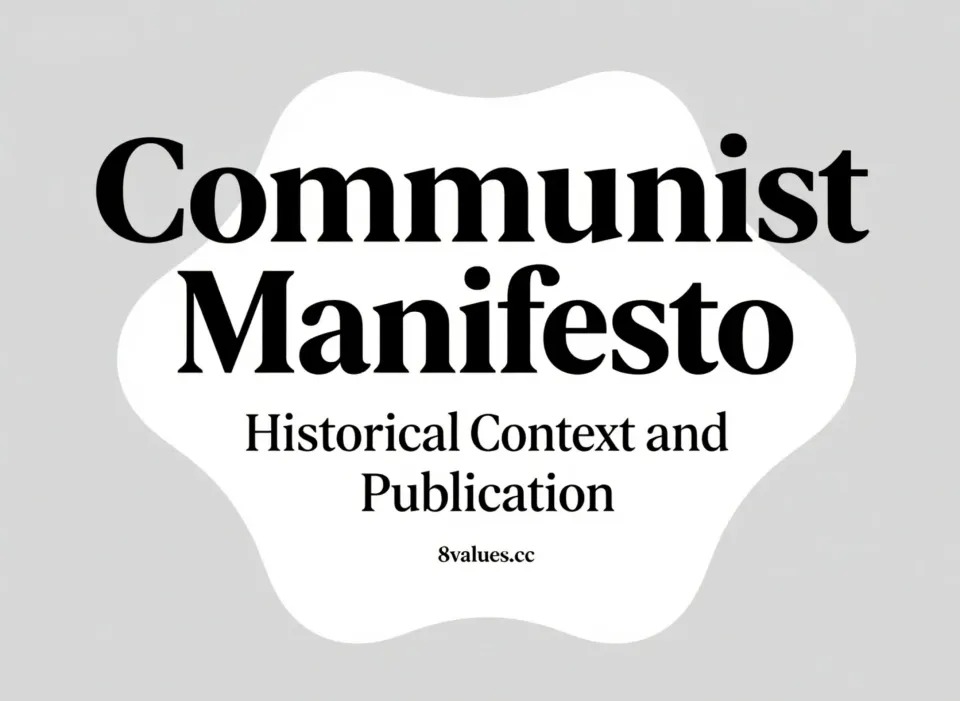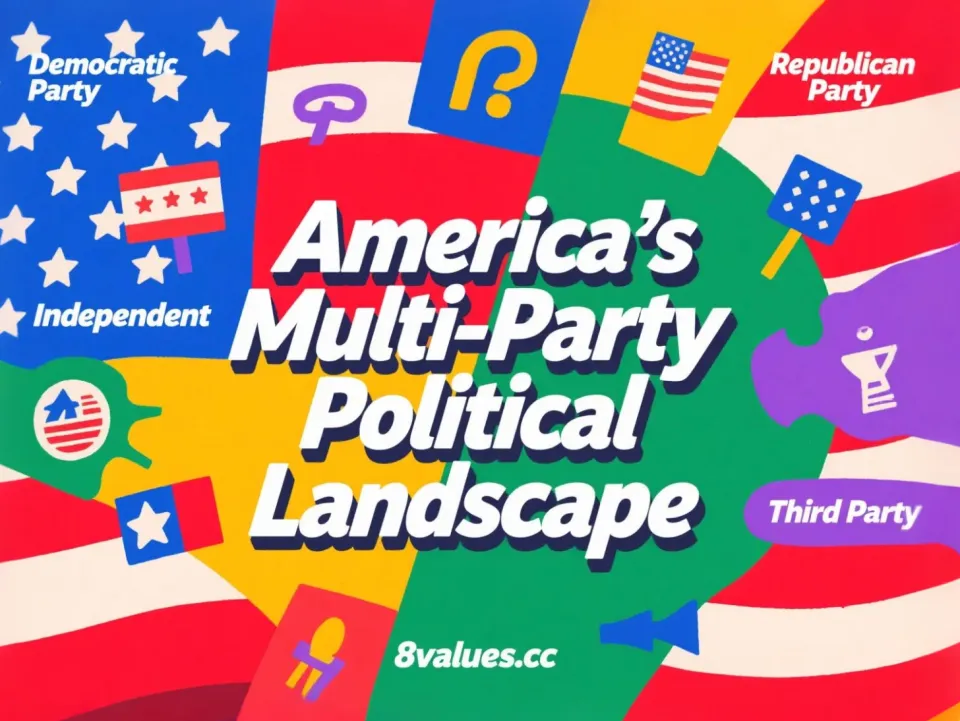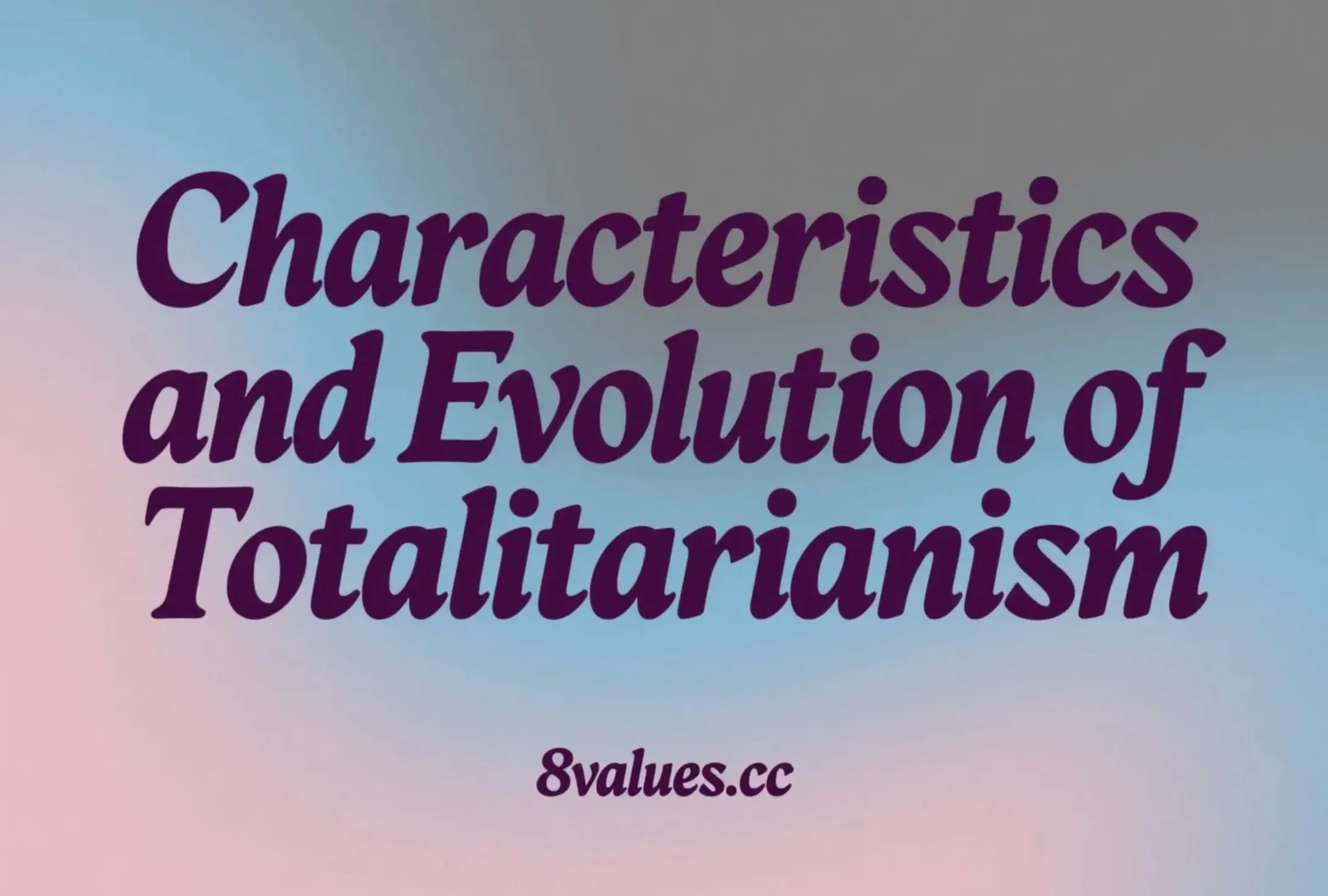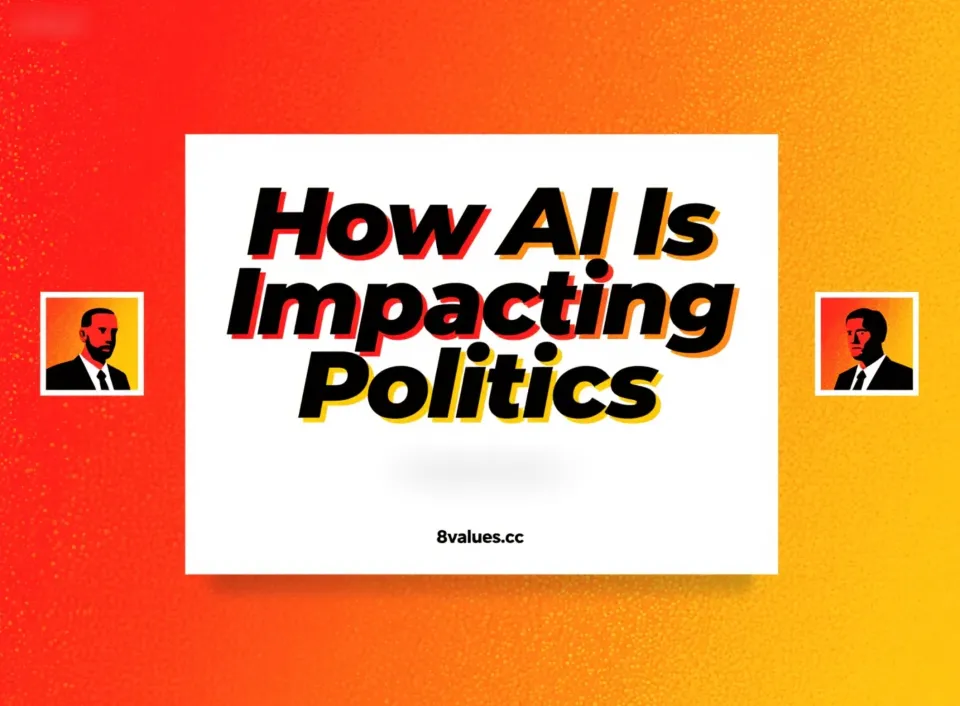Fondamentalisme | 8 Values Interprétation de l'idéologie idéologique des tests politiques
Interprétez profondément l'idéologie de l'intégrisme dans le test politique des 8 valeurs, explorez ses origines, ses caractéristiques fondamentales, ses expressions, ses litiges et ses impacts mondiaux dans les domaines religieux et laïque, vous aidant à comprendre pleinement cette tendance complexe et à trouver votre position dans le spectre politique.
Le "fondamentalisme" est un terme très controversé et profond dans la société contemporaine. Il se réfère non seulement à une tendance de pensée extrêmement conservatrice dans le domaine religieux, mais aussi à un schéma de pensée profondément enraciné et à l'idéologie qui transcende les frontières religieuses et s'étend à un large éventail de domaines tels que la politique, l'économie, la culture et même l'athéisme laïque. Pour les explorateurs qui veulent avoir une compréhension approfondie des différentes idéologies à travers le test politique des 8 valeurs , saisir avec précision la connotation et les manifestations multiples de l'intégrisme est une étape clé dans la compréhension de la complexité de la société mondiale.
La définition de l'intégrisme et de l'origine historique
La définition originale du fondamentalisme, en bref, fait référence à une personne qui suit strictement les principes de base d'un sujet particulier . Par exemple, un bon mathématicien doit suivre et pratiquer les principes de base des mathématiques. L'appliquer dans le domaine de la pensée se manifeste comme adhérant aux principes de base, en particulier le dogme religieux . Cette idéologie se manifeste généralement comme une position réactionnaire , priorisant l'adhésion stricte aux doctrines religieuses fondamentales ou aux idées de base qui ne sont pas influencées par les interprétations modernistes. Il désire revenir aux doctrines et idées originales de ses croyances, idées ou principes, et insiste sur les interprétations littérales et traditionnelles des classiques religieux ou de la littérature centrale .
L'origine du terme a un contexte historique clair. Il a d'abord été largement utilisé aux États-Unis dans les années 1920 en tant que contre-attaque contre la théologie libérale parmi les confessions protestantes. La demande fondamentale de ce mouvement est de défendre les «enseignements fondamentaux» de la foi chrétienne et de résister à l'impact des idées scientifiques modernes telles que la théorie de l'évolution de Darwin et la «critique plus élevée» sur la Bible.
Entre 1910 et 1915, une série de brochures, intitulée The Fundamentals: A Testimy to Truth, financé et publiée par les frères Lyman Stewart et Milton Stewart, visant à défendre les cinq croyances fondamentales de la foi chrétienne: le texte intégral de la Bible, la nature divine de Jésus-Christ; la naissance d'une vierge; la souffrance du Christ pour le péché pour l'humanité; et la résurrection du corps et la résurrection de la chair . Ces textes ont été distribués gratuitement sur une échelle mondiale de 3 millions d'exemplaires. En 1920, les lois CL ont d'abord utilisé le terme «fondamentaliste» dans la revue baptist watchman-censors pour décrire les chrétiens qui se sont battus pour les principes de base de la foi.
Au fil du temps, bien que le concept soit originaire de l'Occident et ait eu une couleur d'auto-identité positive, sa signification s'est progressivement étendue et s'est largement évoluée en un terme désobligeant . Il est utilisé pour faire référence à des groupes considérés comme intolérants, extrêmes et même violents, en particulier lorsqu'ils décrivent les croyances dans les sociétés non occidentales, qui est souvent utilisée par les médias pour diaboliser des groupes spécifiques .
Les caractéristiques fondamentales du fondamentalisme: croyance, pureté et idéologie conflictuelle
Le fondamentalisme, en tant qu'idéologie puissante, possède plusieurs caractéristiques fondamentales qui lui permettent d'être identifiées et appliquées dans différentes cultures et contextes:
Interprétation littérale et autorité absolue de la croyance originale
Les fondamentalistes insistent sur les interprétations littérales et traditionnelles de leurs canons religieux ou de la littérature centrale . Ils considèrent ces textes comme une autorité ultime absolument fiable et indubitable , à l'exclusion de toute interprétation critique libérale, moderniste ou historique, et ne permettant pas aux jeux de mots ou à la place de réservation. Pour eux, l'acquisition de connaissances est comme un processus archéologique, qui consiste à déterrer les vérités existantes des classiques. Cette croyance en la vérité absolue est la pierre angulaire de sa vision du monde et ne peut être doutée.
Cependant, cette interprétation littérale elle-même est contradictoire. Les fondamentalistes de différentes confessions prétendent «interpréter littéralement» la Bible, mais parviennent à des conclusions très différentes, ce qui suggère que toutes les lectures sont une interprétation . Les langues religieuses utilisent souvent des symboles et des analogies, que les fondamentalistes comprennent souvent les faits scientifiques.
Antimodernisme et position antisémite
Le fondamentalisme est une position contre les tendances modernes . Il résiste à l'impact de la théologie libérale, du modernisme, des tendances de la sécularisation, ainsi que des idées scientifiques modernes telles que l'évolution darwinienne et une critique biblique supérieure qui a émergé à la fin du XIXe et au début du 20e siècle. Ils considèrent la sécularisation comme un écart par rapport à la nature de la foi et croient que cela a conduit à la dégradation des valeurs sociales.
Il convient de noter, cependant, que le fondamentalisme n'est pas un simple rejet de la modernité, mais est souvent un produit et une réaction de la modernité . Lors de la lutte contre la modernité, il peut également utiliser efficacement les outils et les technologies modernes , tels que les médias de masse et les stratégies de mobilisation sociale, pour atteindre ses objectifs. Certains chercheurs croient même que la modernité elle-même a également des caractéristiques fondamentalistes potentielles car elle peut également imposer des idées et supprimer la dissidence.
Exclusivité, confrontation et poursuite de la "pureté"
Les fondamentalistes sont absolument sûrs de leurs croyances et croient que les connaissances qu'ils possèdent sont sacrées et à 100% correctes. Cela les amène à nier l'authenticité d'autres croyances et à montrer une forte exclusivité, une confrontation et une combativité . Ils tracent souvent une ligne entre eux et «l'autre» et croient que «nous» sommes les vrais croyants, et que quiconque est différent d'eux est ignorant et même mauvais. Ce désir de poursuivre la «pureté» se reflète par la distinction entre les «groupes internes» et les «groupes externes».
Cette exclusivité se reflète non seulement dans le niveau doctrinal, mais aussi dans la vie réelle, comme se séparer des autres membres de la société en établissant des frontières entre l'espace et la culture. Ils croient que la seule façon d'éliminer la violence est de faire en sorte que tout le monde soit «le même», c'est-à-dire être cohérent avec eux.
L'application complète des doctrines sociales et politiques
Les fondamentalistes croient fermement que les principes obtenus de leurs croyances devraient être appliqués à tous les aspects de la vie sociale, économique et politique . Ils préconisent que la religion devrait guider de manière globale la vie nationale, juridique et sociale et s'opposer à la séparation de l'Église et de l'État. Cette tendance à politiser et à la politique religieuse est l'objectif le plus élevé de son mouvement.
Dans la poursuite des idéaux, les fondamentalistes sont souvent disposés à faire des sacrifices et même à voir l'auto-sacrifice comme faisant partie de leur philosophie centrale. Ils se sentent menacés par leurs ennemis, qu'ils soient réels ou imaginés, et croient qu'ils sont en mission de défendre les droits de Dieu et de réaliser leur volonté .
Expressions interreligieuses de fondamentalisme
Les caractéristiques fondamentales du fondamentalisme permettent de se refléter dans les principales religions du monde, mais les formes spécifiques et les points d'accent varient. Dans l'analyse idéologique de 8 valeurs, le fondamentalisme dans ces contextes religieux constitue une dimension importante pour comprendre son impact mondial.
Fondamentalisme chrétien: croyance fondamentale et impact social
Le "fondamentalisme" est la première forme de fondamentalisme qui est apparue et reconnue par le protestantisme chrétien. Son affirmation centrale est l'inertie et la divinité absolues de la Bible, résistant à la théorie évolutive et à la théologie libérale.
Le fondamentalisme chrétien a une profonde influence dans l'histoire américaine:
- DROIT ET ÉDUCATION : Dans le procès des Scopes de 1925, la loi du Tennessee interdisant l’enseignement de l’évolution dans les écoles a été contestée, un cas mettant en évidence le conflit culturel entre les sciences modernes et les doctrines bibliques. Certaines églises américaines poussent toujours le «créationnisme» dans le programme scolaire public.
- Participation politique : à la fin des années 1970, des organisations telles que la "majorité morale" ont augmenté, ramenant les fondamentalistes chrétiens sur le stade politique américain, promouvant une législation politique telle que l'anti-avortement et le mariage anti-sexe et la formation d'un puissant "droit chrétien". La "majorité morale" dirigée par le révérend Jerry Falwell a remporté les élections de 1980 avec Ronald Reagan.
- École théologique : Le pentecôtisme met l'accent sur l'expérience charismatique et la guérison miraculeuse, tandis que la dispensationalisme défend le développement de l'histoire par étapes et soutient la restauration d'Israël. Ceux-ci ont eu un impact profond sur le christianisme mondial.
- Traditionalisme catholique : par exemple, la Société de Saint-Pie X, qui s'est opposée à la liberté religieuse et à l'unité de la religion et de la politique, a préconisé la restauration de la liturgie catholique et de la théologie avant 1962, et a travaillé avec les partis nationalistes de droite.
Fondamentalisme islamique: un retour au Coran et à la charia
Le fondamentalisme islamique, également connu sous le nom de «rétrome islamique», préconise le retour aux doctrines et aux pratiques des premiers jours de l'islam . Son slogan principal est "le Coran est la Constitution", préconisant que la religion devrait guider de manière approfondie la vie nationale, juridique et sociale et s'opposer à la sécularisation.
Factions principales et formes d'expression:
- Wahhabisme : La religion de l'État de l'Arabie saoudite se caractérise par une stricte conformité à la charia précoce et à l'opposition à l'idolâtrie.
- La République islamique d'Iran : établissez des théories avec la théorie de la «tutelle fakih» et exportez activement des idées révolutionnaires.
- Frères musulmans : une organisation fondamentaliste islamique à large influence dont les idées sont révolutionnaires de la société musulmane sunnite.
- Taliban : En tant que représentant extrême, il promeut violemment la loi islamique stricte, restreint les droits des femmes, interdit aux femmes de recevoir une éducation et détruit même le patrimoine culturel (comme le Bouddha bamien). Les talibans ont refusé de coopérer avec les États laïques et n'ont pas pu établir un gouvernement central ordonné.
- Sayyid Qutb : Ses pensées sont un signe important du changement de fondamentalisme islamique vers le radicalisme. Il pense que tous les systèmes du monde trahissent l'islam et que des mesures doivent être prises pour changer.
Judaïsme Fondamentalisme: loi traditionnelle et identité politique
Le judaïsme est souvent utilisé pour décrire le judaïsme haredi (judaïsme extrêmement orthodoxe) . Ils suivent strictement les interprétations littérales de la Torah et du Talmud, résistent à la sécularisation moderne, adhèrent aux modes de vie traditionnels (tels que les vêtements, l'éducation) et rejettent la politique de service militaire du gouvernement israélien.
En outre, le sionisme religieux radical a également des caractéristiques fondamentalistes, revendiquant le caractère sacré de la «Terre Sainte d'Israël» et plaçant la «loi supérieure» (comme les commandements de la Torah) au-dessus des institutions politiques existantes. Ils ont même eu de la violence, comme l'assassinat d'un croyant fanatique au Premier ministre Rabin.
L'hindouisme et le fondamentalisme sikh: le nationalisme et l'entretien de la tradition
- Le fondamentalisme hindou : principalement manifesté comme "Hindutva", qui est une idéologie nationaliste conçue pour définir clairement l'identité indienne comme hindous. Ils préconisent de restaurer l'ordre social hindou traditionnel et à l'exclusion d'autres religions (comme les musulmans et les chrétiens). Contrairement au fondamentalisme islamique et chrétien, le fondamentalisme hindou met l'accent sur plus de "orthopraxie" que "l'orthodoxie", c'est-à-dire insistant sur certaines pratiques religieuses et formes sociales inchangeables qui y sont associées (telles que les systèmes de castes).
- Fondamentalisme sikh : il s'est développé rapidement dans le sous-continent indien, se combinant avec le nationalisme et le séparatisme. Ils ont exigé d'agir conformément aux doctrines sikhs et avaient conduit à des conflits avec le gouvernement indien en raison de l'opposition à la sécularisation et aux factions culturelles occidentales, ainsi qu'aux facteurs socio-économiques tels que l'injustice de l'allocation des ressources.
Fondamentalisme bouddhiste: identité nationale et exclusivité
Le fondamentalisme bouddhiste existe également dans différentes branches:
- Sri Lanka : les moines bouddhistes utilisent des textes non classiques (comme le Mahavamsa) pour défendre l'utilisation de la force pour protéger le bouddhisme, le combinant avec le nationalisme.
- Japon : Certains membres de la secte de Nichiren ont été accusés de fondamentalisme, condamnant d'autres sectes à travers des voies radicales.
- Tibet : Le culte de la divinité gardienne de Dorje Shugden dans le bouddhisme tibétain du XIXe siècle est considéré comme un exemple de fondamentalisme, qui s'oppose aux doctrines mixtes non de gelug et protège même la tradition de Gelug par des moyens violents.
Application de l'intégrisme et des pensées politiques dans le domaine laïque
La portée de l'application du terme «fondamentalisme» a dépassé de loin le domaine religieux, s'étendant à des contextes laïques tels que la politique, l'économie, la culture et même l'athéisme, et est utilisé pour décrire l'adhésion dogmatique et sans compromis à certains principes ou idéologies de base.
Fondamentalisme politique: absolualisation de l'idéologie
Le fondamentalisme politique fait référence à l'élévation d'une idéologie politique particulière, du parti ou du chef d'État à la suprématie et à la limitation des idées compétitives. Par exemple, il y avait des «fonds» (fondamentalistes) en Allemagne qui ont refusé de faire des compromis avec d'autres parties. Le terrorisme gauche et droit, comme l'IRA, le pays basque et la liberté (ETA), la faction de l'Armée rouge (RAF), etc., sont également considérés comme un fondamentalisme violent.
Au niveau national, il se manifeste comme mettant certains principes politiques ou dirigeants au-dessus de tout. Par exemple, certains chefs d'État considèrent la guerre froide comme un «djihad», en utilisant la rhétorique religieuse pour soutenir l'intervention militaire ou les opérations de lutte contre le terrorisme domestiques.
Fondamentalisme économique: la croyance en la théorie universelle du marché
Un exemple typique de fondamentalisme économique est le «fondamentalisme du marché». Il estime que les politiques économiques sur le marché libre sont le meilleur moyen de résoudre les problèmes économiques et sociaux et sont impeccables, préconisant la minimisation de l'intervention du gouvernement et la promotion de la vague de privatisation. Cette croyance estime que toutes les entités économiques devraient faire face exactement aux mêmes conditions de concurrence et préconisent l'élimination des frontières de l'État pour promouvoir le commerce.
Culture et fondamentalisme ethnique: exclusivité de l'identité
Le fondamentalisme culturel ou national fait référence à la croyance que certaines cultures, langues et traditions sont «meilleures» ou meilleures que d'autres et les concernant comme une ligne directrice. Ceci est souvent confondu avec le racisme et la xénophobie.
- Fondamentalisme confucéen dans l'histoire chinoise : la compréhension dogmatique des responsables de Qing feu des livres des sages et déteste tous les changements, y compris l'introduction de la technologie pratique, a sérieusement ralenti le processus de modernisation de la Chine.
- Lega Nord de l'Italie : Dans la vague de l'immigration, il tente de construire son identité mythologique "Padanienne" unique et exclut la culture sud.
- Nativisme américain : une combinaison avec des mouvements xénophobes tels que le "KKK", mettant l'accent sur le retour à "l'Évangile à l'ancienne" et "pur américanisme", et en traitant la Bible et la Constitution américaine comme une seule.
- Populisme moderne de droite : en Europe, le populisme de droite (comme le Front national en France, le parti de sélection de l'Allemagne) combine le christianisme et le nationalisme comme symbole de l'identité défensive en attaquant les immigrants et la culture musulmane.
Fondamentalisme athée: doctrine laïque et pensée critique
Le fondamentalisme athée fait référence à la persistance dogmatique de l'idéologie laïque ou de l'athéisme, qui est la seule source de vérité objective, et réfute dogmatiquement toute preuve qui entre en conflit avec le matérialisme. Certains commentateurs considèrent même les Lumières elle-même comme ayant les caractéristiques de «fondamentalisme» car elle peut également imposer des idées et supprimer la dissidence. Par exemple, pendant la guerre froide, l'Albanie s'est déclarée «État athée», ou les restrictions de la France à la démonstration religieuse en public étaient appelées «fondamentalisme laïque».
La tendance fondamentaliste de la modernité elle-même
De nombreux chercheurs soulignent que le fondamentalisme n'est pas une "reliques culturelles découvertes" séparées de la vie moderne, mais un phénomène de modernité et une réaction aux tendances et aux problèmes du monde contemporain. Il peut utiliser la technologie moderne (comme les médias de masse, les armes avancées) pour se propager et atteindre ses objectifs. De plus, certains chercheurs croient que la «modernité» elle-même a également des caractéristiques fondamentalistes potentielles car elle peut également imposer des idées et supprimer la dissidence. Par exemple, la croyance dans l'universalisme scientifique, l'espoir laïque pour l'histoire et le messianisme politique peut tous être considérés comme les fondements fondamentalistes de la modernité elle-même.
Controverse et réflexion critique sur le fondamentalisme
L'utilisation généralisée du concept de «fondamentalisme» en fait un outil analytique très complexe et controversé et l'un des résultats idéologiques qui doivent être soigneusement interprétés dans le test politique de 8 valeurs .
Désobligeant et stigmatisation des termes: obstacles au débat
Le mot est souvent utilisé comme un «mot désobligeant» ou un «mot de serment» pour relier l'intolérance, les extrêmes et la violence à des groupes spécifiques, éliminant ainsi les dissidents, mettant fin au dialogue, et même condamnant ou diabolisant des groupes spécifiques . Cette utilisation est souvent destinée à maintenir sa propre position ou son statut social, et une fois étiqueté comme «fondamentaliste» est exclu de tout dialogue raisonnable dès le début . De nombreux experts rejettent même complètement le terme.
Relation avec la violence et le terrorisme: distinguer et connecter
Bien que le «fondamentalisme islamique» ait presque assimilé aux «terroristes» ces dernières années, tous les fondamentalistes ne soutiennent pas la violence . La recherche sur le plus grand projet fondamentaliste du monde montre que la grande majorité des fondamentalistes, quelles que soient leurs tendances, ne sont pas violents et ont peu d'ambitions politiques .
Cependant, l'extrémisme religieux est souvent considéré comme la racine superficielle et la manifestation spéciale du terrorisme international . Lorsque le fondamentalisme est combiné avec le pouvoir politique, il peut glisser vers l'extrémisme. Le terrorisme se fait non seulement par les fondamentalistes, mais le fondamentalisme détruit le remblai de la conscience à travers la soi-disant «foi», faire croire aux gens que tuer les gens pour la «foi» ne fait pas le mal mais le bien.
Sélectivité et ambiguïté: les limites des concepts
Les critiques croient que le terme «prend souvent le pot entier» de groupes et de phénomènes complexes et divers, couvrant les énormes différences et diversité entre les différents groupes. Les exemples sont souvent sélectifs et reflètent davantage les préférences ou les aversions de l'examinateur que les normes académiques rigoureuses. La communauté académique n'a pas de définition unifiée et reconnue du «fondamentalisme», ce qui conduit au sens vague du mot dans différents contextes, ce qui conduit facilement à des difficultés de communication.
Par exemple, certains érudits critiquent le mot pour simplifier trop son immense diversité en décrivant les évangéliques américains. En outre, il existe des doubles standards pour l'utilisation du mot, comme les écoles Waldorf sont rarement appelées «fondamentalisme», malgré les énormes différences dans la façon dont ils enseignent et les réglementations gouvernementales.
Le fondamentalisme est un phénomène moderne: la réflexion sur la société moderne
De nombreux chercheurs soulignent que le fondamentalisme n'est pas une "reliques culturelles découvertes" séparées de la vie moderne, mais un phénomène de modernité et une réaction aux tendances et aux problèmes du monde contemporain. Il peut utiliser la technologie moderne (comme les médias de masse, les armes avancées) pour se propager et atteindre ses objectifs.
Les fondamentalistes se considèrent souvent comme des groupes travaillant à préserver les valeurs traditionnelles dans un monde rapidement moderne. L'insécurité qu'ils ressentent peut être en partie due à l'impact de la mondialisation et de la sécularisation. Par conséquent, le fondamentalisme peut être considéré comme une «transformation religieuse déterminée par la modernité».
La façon de gérer le fondamentalisme: le dialogue et la compréhension
Face aux défis relevés par le fondamentalisme, les données proposent une série de stratégies de réponse:
- Dialogue et tolérance : les fondamentalistes ne doivent pas être simplement stigmatisés ou exclus, mais la radicalisation doit être résolue par le dialogue et la tolérance constructifs. Une simplification excessive et une stigmatisation ne feront que gêner le dialogue et la compréhension réels.
- Le respect des droits de l'homme et de la liberté religieuse : un groupe qui respecte la liberté religieuse ne devrait pas être appelé fondamentalisme, au contraire, le rejet de la liberté religieuse est un indicateur clair de la direction de l'intégrisme . Les discussions sur la vérité des croyances religieuses devraient être distinguées du désir de vie politique pacifique.
- La distinction du comportement de la croyance : être capable de distinguer les remarques religieuses et les actions pratiques est crucial. Tous ceux qui lisent les Écritures ne recourent pas littéralement à la violence.
- Cultivez la pensée critique et l'autocritique : encourager les discussions calmes sur les lois et les réglementations supérieures, les questions à remettre en question et à maintenir une perspective autocritique. La pensée critique peut aider les gens à réaliser que toutes les valeurs traditionnelles ne sont pas négatives.
- Résolvez la cause profonde : l'élevage de l'intégrisme est souvent lié à des problèmes sociaux et économiques tels que l'aliénation sociale, la dislocation culturelle, le manque de valeurs et la pauvreté et le chômage. En fournissant l'éducation, les possibilités d'emploi et les garanties de bien-être, il aide à affaiblir son attrait.
Résumé: Comprendre l'idéologie fondamentaliste d'un monde diversifié
Le fondamentalisme est un phénomène mondial complexe qui existe dans les domaines religieux et laïc sous de nombreuses formes. Ce n'est pas seulement une réaction à l'impact de la modernité, mais aussi une manifestation de la modernité elle-même. Dans le test politique des 8 valeurs , la compréhension de la connotation diversifiée du résultat idéologique du «fondamentalisme» nous aidera à mieux comprendre la complexité des pensées politiques mondiales et éviter la tendance à simplifier et à stigmatiser.
Pour bien comprendre l'intégrisme, nous devons:
- Prenez une perspective critique plutôt que de critique : reconnaître que le terme est souvent abusé, visant à mettre fin aux conversations par la stigmatisation.
- Distinguer la croyance et le comportement : toutes les croyances ferme dans les principes fondamentaux ne mènent pas à la violence ou à l'extrémisme.
- Comprendre sa dimension de modernité : le fondamentalisme n'est pas une relique historique, mais une réponse aux problèmes et aux tendances du monde moderne, et peut utiliser efficacement les outils modernes.
- Effectuer une analyse interculturelle et interdomaine : le voir comme une tendance humaine universelle plutôt que comme un brevet pour une religion ou une culture particulière.
- Recherche de dialogue et de compréhension : ce n'est que par le dialogue ouvert et la tolérance de la dissidence que les défis qu'il apporte peut-il vraiment résoudre.
En plongeant dans les origines, les caractéristiques fondamentales, les applications interreligieuses et laïques de l'intégrisme et la controverse entourant le concept, nous sommes en mesure de mieux penser de manière critique dans un paysage mondial complexe et modifiable et favoriser la compréhension mutuelle et la coexistence pacifique entre différentes croyances et idéologies.
Pour un contenu plus excitant, vous pouvez lire le blog 8Values !
